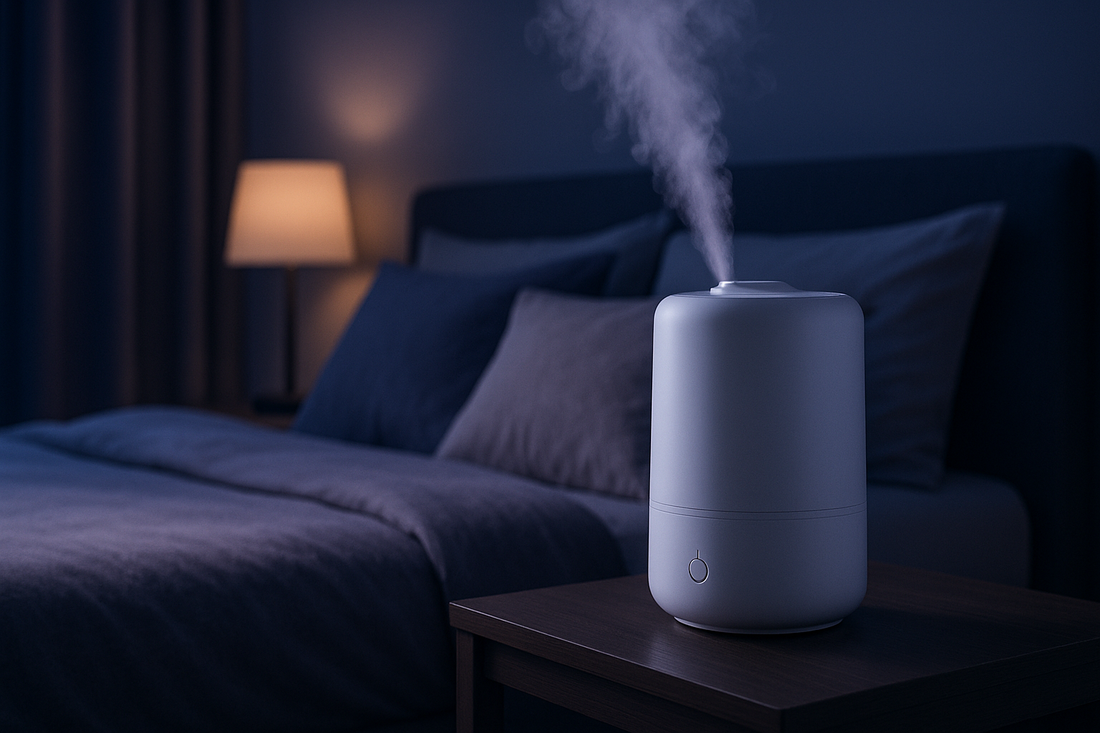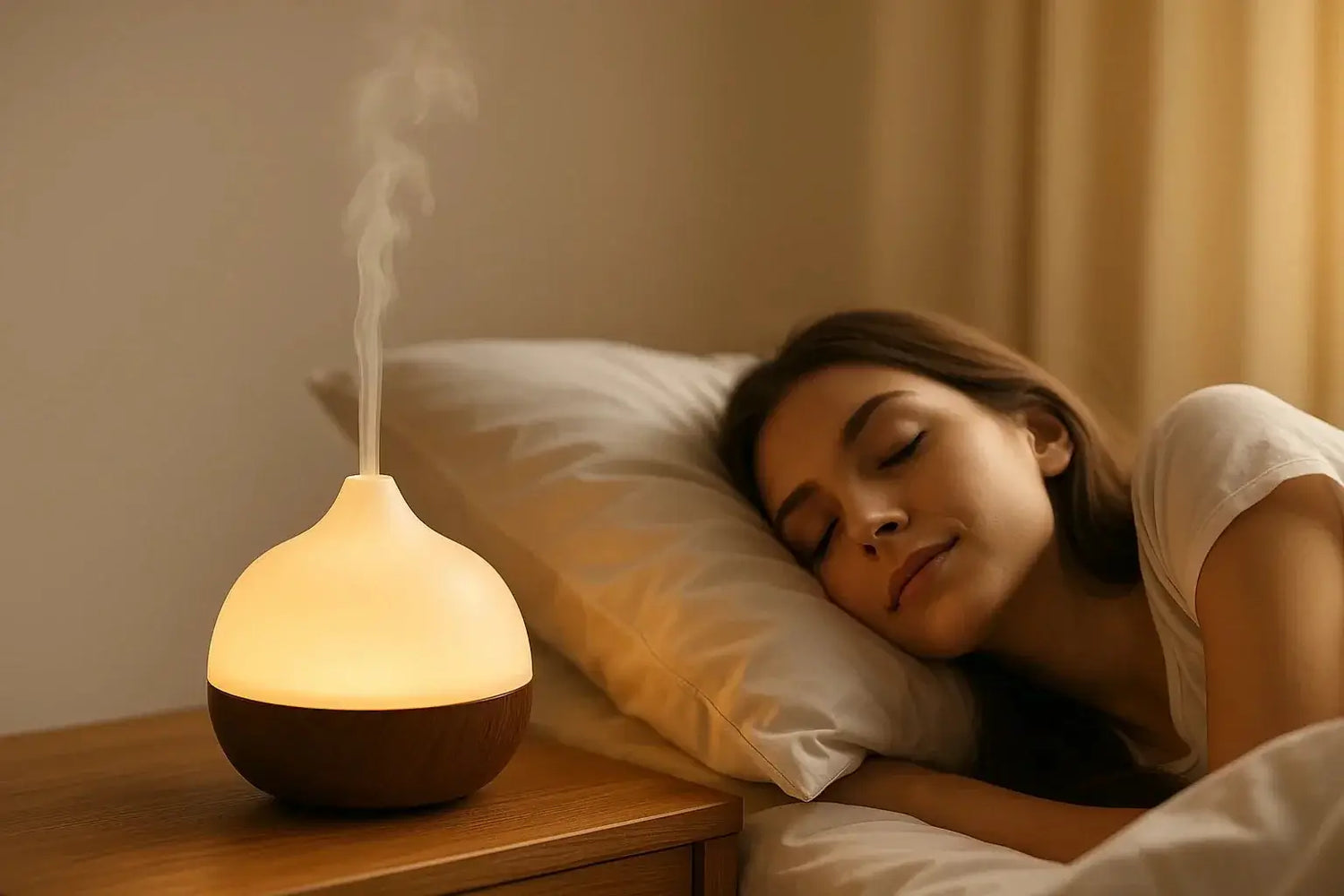
Should You Sleep with a Humidifier Every Night? (Science Says Yes)
Share
If you've ever woken up with a dry throat, stuffy nose, or cracked lips, you've experienced the effects of dry bedroom air. But is running a humidifier every single night the solution—or could it cause problems?
The short answer: Yes, sleeping with a humidifier every night is not only safe but highly beneficial for most people, especially if you live in a dry climate or use heating and air conditioning.
In this guide, you'll discover the science-backed benefits of nightly humidifier use, potential risks to avoid, and exactly how to use a humidifier for optimal sleep quality.
Why Bedroom Air Gets So Dry at Night
Your bedroom air naturally loses moisture throughout the night due to:
- Heating systems that dry out indoor air by 10-20%
- Air conditioning that removes humidity while cooling
- Low outdoor humidity in winter or dry climates
- Poor ventilation that prevents moisture circulation
Most bedrooms drop to 20-30% humidity at night—far below the optimal 40-60% range recommended by sleep experts and pulmonologists.
This chronic dryness affects your sleep quality, respiratory health, and skin condition.
The Science: Benefits of Sleeping with a Humidifier Every Night
1. Easier Breathing and Better Sleep Quality
The research: A study published in the Journal of Clinical Sleep Medicine found that maintaining 40-60% humidity improved sleep quality by 23% and reduced nighttime awakenings by 31%.
How it works: Dry air irritates your nasal passages and throat, causing inflammation that makes breathing difficult. Proper humidity keeps your airways moist and open, allowing easier airflow throughout the night.
Result: You fall asleep faster, sleep more deeply, and wake up feeling more refreshed.
2. Reduced Snoring
The science: Dry air causes throat tissues to swell and vibrate more during breathing—the primary cause of snoring.
How humidifiers help: By keeping your throat and nasal passages lubricated, humidifiers reduce tissue vibration and airway restriction.
Real results: Partners of snorers report 30-50% reduction in snoring volume when using a bedroom humidifier consistently.
3. Relief from Dry Skin and Lips
The problem: Your skin loses moisture to dry air while you sleep, causing cracked lips, flaky skin, worsened eczema, and premature aging.
The solution: A humidifier replenishes moisture in the air, allowing your skin to retain hydration for 8 hours straight.
Dermatologists recommend sleeping with a humidifier as one of the most effective ways to combat winter dry skin.
4. Fewer Colds and Respiratory Infections
The science: Research shows that maintaining 40-60% humidity reduces airborne virus survival by 85%.
Why it matters: Dry air allows cold and flu viruses to remain airborne longer and makes your nasal passages more vulnerable to infection.
The benefit: Running a humidifier every night during cold and flu season can significantly reduce your risk of getting sick.
5. Relief from Allergies and Asthma
How it helps: Proper humidity soothes irritated airways, reduces dust circulation, prevents nasal congestion, and makes breathing easier for asthma sufferers.
Important note: Keep humidity at 40-50% (not higher) to prevent mold growth that could worsen allergies.
Is It Safe to Run a Humidifier All Night, Every Night?
Yes—with proper maintenance and settings.
Modern humidifiers are designed for continuous nightly use with built-in safety features:
- Auto shut-off when water runs out
- Cool mist technology (no burn risk)
- Whisper-quiet operation (won't disturb sleep)
- Large water tanks (8-12 hour runtime)
The key: Keep humidity at 40-50% and clean your humidifier weekly to prevent mold and bacteria growth.
How to Use a Humidifier for Best Sleep Results
Step 1: Choose the Right Humidifier
For bedrooms, choose ultrasonic cool mist with a 3-5 liter tank that runs 10-12 hours, adjustable mist output, and auto shut-off.
Step 2: Position It Correctly
Best placement:
- 3-6 feet from your bed (not directly next to your pillow)
- On a nightstand or dresser (elevated 2-3 feet off the floor)
- Away from walls (prevents condensation and mold)
- On a waterproof mat (protects furniture)
Step 3: Set the Right Humidity Level
Optimal range: 40-50% humidity
Start with medium mist setting, use a hygrometer to monitor levels, adjust output as needed, and run it all night (8-10 hours).
Step 4: Maintain It Weekly
Weekly cleaning routine:
- Empty remaining water
- Fill tank with white vinegar
- Let sit for 30 minutes
- Scrub with soft brush
- Rinse thoroughly
- Air dry completely
- Refill with fresh distilled water
This takes 10 minutes and prevents 99% of problems.
The Bottom Line
Yes, you should sleep with a humidifier every night if you live in a dry climate, use heating/AC, wake up with dry throat or skin, snore or have breathing difficulties, or suffer from allergies or asthma.
The key to success: Maintain 40-50% humidity, clean your humidifier weekly, and use distilled water.
Most people notice dramatic improvements within 3-5 nights:
- Easier breathing
- Less snoring
- Better sleep quality
- Softer, more hydrated skin
- Fewer morning headaches
Transform your bedroom into the perfect sleep environment with a quality humidifier designed for nightly use. Start breathing easier and sleeping better tonight. 💤

